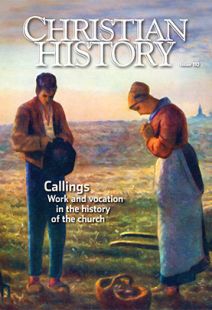Reading scripture, washing feet
Chapter 35: Kitchen servers of the week
1The brothers should serve one another. Consequently, no one will be excused from kitchen service unless he is sick or engaged in some important business of the monastery, 2for such service increases reward and fosters love. 3Let those who are not strong have help so that they may serve without distress, 4and let everyone receive help as the size of the community or local conditions warrant. 5If the community is rather large, the cellarer should be excused from kitchen service, and, as we have said, those should also be excused who are engaged in important business. 6Let all the rest serve one another in love.
7On Saturday the brother who is completing his work will do the washing. 8He is to wash the towels which the brothers use to wipe their hands and feet. 9Both the one who is ending his service and the one who is about to begin are to wash the feet of everyone. 10The utensils required for the kitchen service are to be washed and returned intact to the cellarer, 11who in turn issues them to the one beginning his week. In this way the cellarer will know what he hands out and what he receives back.
Chapter 53: reception of guests
1All guests who present themselves are to be welcomed as Christ, for he himself will say: I was a stranger and you welcomed me (Matt. 25:35). 2Proper honor must be shown to all, especially to those who share our faith (Gal. 6:10) and to pilgrims. 3Once a guest has been announced, the superior and the brothers are to meet him with all the courtesy of love.
4First of all, they are to pray together and thus be united in peace, 5but prayer must always precede the kiss of peace because of the delusions of the devil. 6All humility should be shown in addressing a guest on arrival or departure. 7By a bow of the head or by a complete prostration of the body, Christ is to be adored because he is indeed welcomed in them.
8After the guests have been received, they should be invited to pray; then the superior or an appointed brother will sit with them.9 The divine law is read to the guest for his instruction, and after that every kindness is shown to him. 10The superior may break his fast for the sake of a guest, unless it is a day of special fast which cannot be broken. 11The brothers, however, observe the usual fast. 12The abbot shall pour water on the hands of the guests, 13and the abbot with the entire community shall wash their feet. 14After the washing they will recite this verse: God, we have received your mercy in the midst of your temple (Ps. 47[48]:10). 15Great care and concern are to be shown in receiving poor people and pilgrims, because in them more particularly Christ is received; our very awe of the rich guarantees them special respect.
From The Rule of Saint Benedict (translated by the monks of The Monastery of Christ in the Desert, http://christdesert.org).
By Benedict of Nursia
[Christian History originally published this article in Christian History Issue #110 in 2014]
Next articles
Perpetua’s calling to Christ leads her to separate from her family
Excerpt from Perpetua’s martyrdom account
PerpetuaAn early church list of unacceptable jobs for Christians
Charioteers, prostitutes and military governors all had to quit
The Apostolic TraditionDuty and delight
Medieval Christians lived in a tension between action and contemplation, between this world and the next
Edwin Woodruff TaitSupport us
Christian History Institute (CHI) is a non-profit Pennsylvania corporation founded in 1982. Your donations support the continuation of this ministry
Donate



